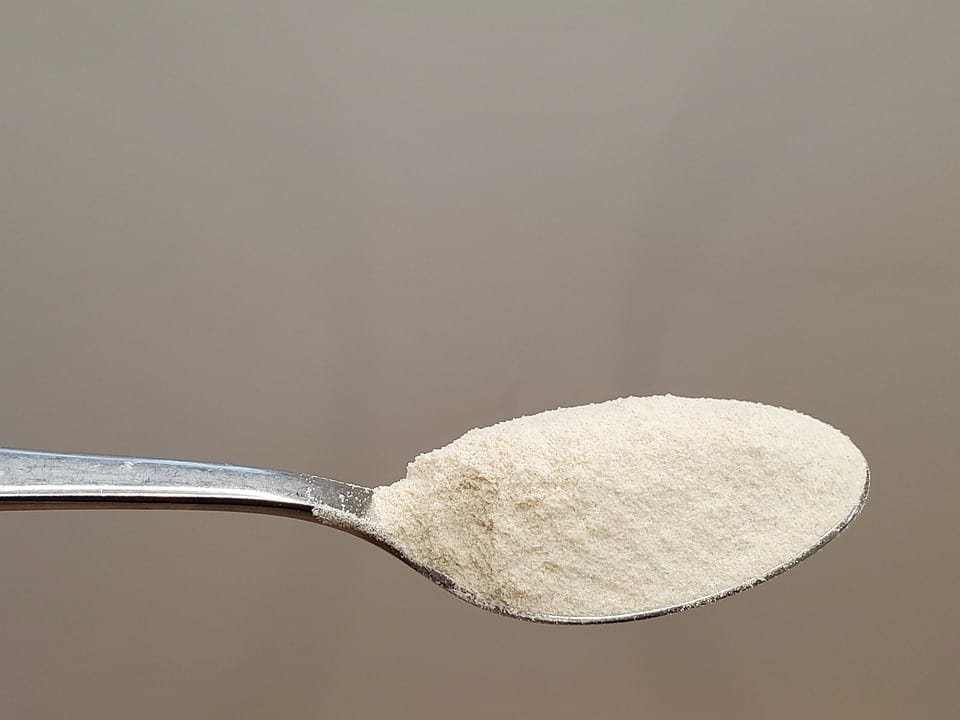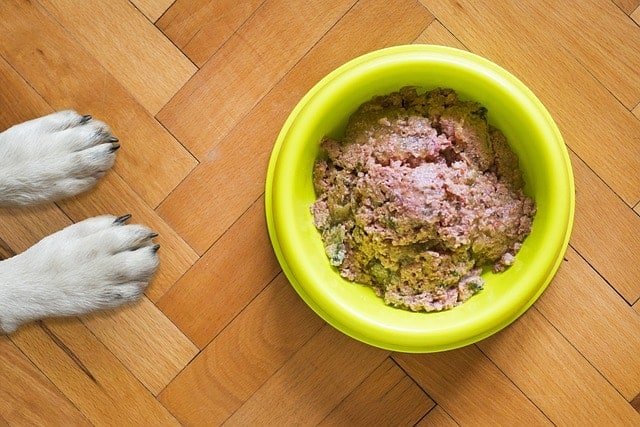Can Dogs Eat Collagen Powder?

Are you a dog owner looking for ways to promote your furry friend’s health and well-being? If so, you may have heard of collagen powder and its potential benefits for humans. But what about dogs? Can dogs eat collagen powder and also benefit from this trendy supplement?
Collagen is a protein that is found in the connective tissues of animals, including dogs. It plays an important role in maintaining healthy bones, joints, and skin. In this blog post, we’ll dive into the world of collagen powder for dogs, exploring what it is, how it works, and whether it’s safe for your pup to consume.
Whether you’re a seasoned dog owner or new to the game, we’ll cover everything you need to know about collagen powder and your furry friend. So, let’s get started.
Can Dogs Eat Collagen Powder?
Yes, dogs can have collagen powder as it provides supplemental collagen which helps dogs to prevent joint diseases and support the development of stronger bones. It can also help with skin health, wound healing and prevent arthritis in dogs.
Even though collagen powder is great for your dogs, it is important to give dogs collagen supplements in moderation. The recommended dose of Collagen for dogs will vary depending on the size of your dog and the form of Collagen you are using.
It is always best to follow the dosing instructions on the product label or consult with your veterinarian to determine the appropriate dose for your dog.
Read also, Can Dogs Eat Tylenol? Vets Reveal The Truth And Precautions

Can puppies have collagen powder?
Puppies can have collagen powder, but it’s important to note that they typically do not need it as much as older dogs. Their bodies are still developing, and they have a natural supply of collagen. However, if your puppy is experiencing joint issues or you want to take a preventative approach, you can consult with your veterinarian and consider adding collagen powder to their diet. It’s important to use a high-quality collagen powder specifically designed for dogs and to follow the recommended dosage based on their weight.
Can Dogs Eat Collagen Powder Made For Humans?
Yes, dogs can eat human collagen powder, however, it is not recommended. Human collagen is specifically formulated for human use, and the purity and quality standards may not be suitable for dogs. Additionally, there may be added ingredients or processing methods used in human collagen products that are not safe for dogs to consume. Therefore, it is best to stick with collagen supplements that are specifically formulated for dogs.
Read this article next: Uncovering The Truth: Can Dogs Eat Plantains?
Health Benefits of Collagen For Dogs
Here are some of the top benefits of collagen for dogs;
- Helps to improve Joint health: Collagen is an essential component of cartilage, which protects and supports the flexibility of joints. By adding collagen powder to their diet, dogs may experience fewer joint problems and better joint health.
- Improves skin and coat health of dogs: The structure of the skin depends heavily on collagen. Collagen powder added to your dog’s diet may help produce a lustrous, healthy coat while enhancing the elasticity and firmness of their skin.
- Gives dogs better digestion of food: Collagen contains amino acids that support gut health and can help heal leaky gut syndrome. It may also aid in the digestion of food and improve nutrient absorption.
- Helps to heal wounds faster: Collagen can help speed up the healing process of wounds and injuries in dogs. It also helps reduce inflammation and prevent scar tissue formation.
- Supports muscle growth and recovery: Collagen is an essential component of muscle tissue and may help promote muscle growth and recovery in active or athletic dogs.
- Helps to boost dog Immune system: Collagen contains important amino acids that support the immune system, helping dogs fight off infections and diseases.
- Improves bone health: Collagen is a crucial component of bones, and supplementing your dog’s diet with collagen powder may help improve bone density and strength.
- Relieves certain allergies: Collagen has been shown to have anti-inflammatory properties and may help alleviate allergy symptoms in dogs.
- Improves dental health: Collagen is also an essential part of teeth, and supplementing your dog’s diet with collagen powder may help improve their dental health.

Risks of Giving Dogs Collagen Powder
While there may be potential benefits to giving dogs collagen powder, there are also some risks to consider:
- Unknown long-term effects: There is limited scientific research on the long-term effects of giving dogs collagen powder, so it’s difficult to say for certain what the potential risks may be. Some say the long-term use of Collagen may cause liver damage. But while this is not common, it is important to be aware of this potential risk.
- Quality control issues: Some collagen supplements may not be regulated, and there’s a risk that they may contain harmful additives or contaminants.
- Dogs may develop digestive issues: Adding new supplements to a dog’s diet can sometimes cause digestive upset, such as diarrhea or vomiting.
- Some dogs may have allergic reactions: Dogs may have allergic reactions to certain types of collagen or to other ingredients in the supplement.
- Collagen can interfere with medication: Collagen powder may interact with certain medications, so it’s essential to consult with your veterinarian before introducing it to your dog’s diet.
Check this out: Can Dogs Eat Roast Beef? The Answer May Surprise You
When to Start Giving Dogs Collagen Powder
If you want to help your dog fend off some of the aches and pains of the aging process down the road, it’s recommended to start supplementing their diet with collagen early on. Although young dogs don’t have the same need for supplemental collagen as older canines, osteoarthritis, and joint disease can start earlier than many people expect, especially in breeds that are more susceptible to joint disease.
By adding collagen to your dog’s diet early, you may be able to keep them pain-free for longer. However, before introducing collagen powder, it’s important to consult with your veterinarian to determine the appropriate dosage and ensure that it’s safe for your dog. If your dog is showing signs of pain, lack of mobility, or lack of agility, it may be time to start supplementing with collagen.
What Is The Recommended Dosage of Collagen Powder For Dogs
The recommended dose of Collagen for dogs will vary depending on the size of your dog and the form of Collagen you are using.
To determine your dog’s daily collagen dose, you can use a simple formula that takes their body weight into account. Multiply your dog’s body weight in pounds by 0.33 to get their daily collagen dose in grams. For example, if your dog weighs 40 pounds, their daily collagen dose would be 13.2 grams of collagen powder.
It’s important to keep in mind that this is a general recommendation. As a result, you should always consult with your veterinarian to determine the appropriate dosage for your individual dog. You should also read the label of the product to know the appropriate dosage of collagen for your dog.
Also, read about the 6 Reasons Why Your Dog Should Be Eating Sauerkraut Right Now

How To Choose A Good Quality Collagen For Dogs
When it comes to choosing a good quality collagen powder for your dog, there are several factors to consider. Here are some tips to help you choose a collagen powder that is safe and effective for your furry friend:
- Know the source: Look for a collagen powder that is sourced from high-quality, grass-fed, or pasture-raised animals. This ensures that the collagen is free from antibiotics, hormones, and other harmful substances.
- Check for purity: Make sure the collagen powder you choose is free from fillers, additives, and artificial preservatives. Look for products that contain only pure collagen.
- Confirm the type of collagen: There are different types of collagen, including type I, II, and III. Type II collagen is the most beneficial for joint health, so look for a collagen powder that contains this type.
- Check for the processing method: Opt for a collagen powder that is processed using gentle methods, such as enzymatic hydrolysis. This helps to preserve the integrity and bioavailability of the collagen.
- Select certified collagen products: Look for collagen powders that have been certified by reputable third-party organizations, such as NSF International or the USDA. This ensures that the product has been tested for quality and safety.
How to Introduce Collagen to Dogs
Introducing collagen to your dog’s diet is easy and straightforward. Here are some tips to help you get started:
- Start slowly and increase the dosage gradually: When introducing any new supplement to your dog, it’s important to start with a small amount and gradually increase the dosage. This will help your dog’s digestive system adjust to the new addition to their diet.
- Mix with food: Collagen powder can be mixed in with your dog’s food. Simply sprinkle the recommended dosage over their meal and mix well.
- Use a flavored collagen powder: Some collagen powders are available in different flavors that your dog might enjoy, such as beef or chicken. This can make it easier to introduce the supplement to your dog and encourage them to eat it.
- Monitor your dog’s reaction: After introducing collagen to your dog’s diet, keep an eye out for any changes in their behavior or digestion. If you notice any adverse effects, such as vomiting or diarrhea, stop giving your dog collagen and consult with your veterinarian.
Alternatives to Collagen
If you’re looking for alternatives to collagen for your dog, there are several options available to you. Here are a few to consider:
- Glucosamine and Chondroitin: These supplements help to improve joint health and can be a great alternative to collagen.
- Omega-3 Fatty Acids: These healthy fats help to reduce inflammation and can improve joint health.
- Bone Broth: This is a natural source of collagen and can be a great alternative to collagen supplements. It also contains other beneficial nutrients like glucosamine and chondroitin.
- Turmeric: This spice has anti-inflammatory properties and can help to reduce joint pain.
- MSM: This supplement contains sulfur, which is important for joint health. It can also help to reduce inflammation.
- Hyaluronic acid: Hyaluronic acid can be used in place of Collagen. It is another supplement for nourishing joints and keeping your dog healthy, happy, and cared for.
Conclusion
Can dogs eat collagen powder? Yes! The answer is now very obvious to us. collagen powder is a beneficial supplement for dogs, especially for their joint health. While it is not a miracle cure, it can be an excellent addition to their diet.
As with any supplement or medication, it is important to consult with your veterinarian before adding it to your dog’s diet. Additionally, when purchasing collagen powder, it is crucial to select a high-quality product from a reputable brand.
Ultimately, by taking the necessary precautions, you can help your furry friend live a longer, healthier, and happier life.
Frequently Asked Questions Similar to “Can Dogs Eat Collagen Powder?”
How long should I give my dog collagen?
The duration of collagen supplementation can vary depending on your dog’s individual needs. It can be beneficial to give collagen consistently over a long period, especially for dogs with joint issues or aging concerns. However, it’s best to consult with your veterinarian to determine the appropriate duration based on your dog’s specific health condition.
Can I give my dog collagen every day?
Yes, you can give your dog collagen every day. Collagen is generally safe for daily use. However, it’s crucial to follow the recommended dosage based on your dog’s weight and consult with your veterinarian before starting any new supplement regimen.
Are there any side effects of giving dogs collagen powder?
Collagen powder is generally well-tolerated by dogs, but some may experience mild digestive upset, such as diarrhea or vomiting. If you notice any adverse reactions, discontinue the use of collagen powder and consult with your veterinarian.
Can collagen powder help with my dog’s joint health?
Yes, collagen powder can be beneficial for supporting joint health in dogs. Collagen is a vital component of cartilage, which cushions joints. Supplementing with collagen may help improve joint mobility and reduce the risk of arthritis or joint pain.
Are all collagen powders safe for dogs?
Not all collagen powders are created equal. It’s important to choose a high-quality collagen powder specifically formulated for dogs or pets. Some collagen supplements intended for human use may contain additives or ingredients that could be harmful to dogs. Always select a product recommended by your veterinarian or certified for use in dogs.
Can collagen powder benefit my dog’s skin and coat?
Yes, collagen is essential for skin health and can contribute to a shiny and healthy coat in dogs. It supports the structure and elasticity of the skin, promoting a more youthful appearance and reducing dryness or flakiness.
Is collagen powder suitable for all dog breeds and ages?
Yes, collagen powder can be given to dogs of all breeds and ages. However, the dosage may vary based on their size and health condition. Consult with your veterinarian to determine the appropriate dosage for your specific dog.
Can collagen powder help with my dog’s digestion?
Collagen contains amino acids that support gut health, helping with digestion and nutrient absorption. It may be beneficial for dogs with certain digestive issues, but individual responses may vary. Consulting with your veterinarian is recommended for personalized advice.
Can I give collagen powder to my pregnant or nursing dog?
While collagen powder is generally considered safe, it’s best to consult with your veterinarian before giving it to a pregnant or nursing dog. They can provide guidance based on your dog’s unique situation.
Can I combine collagen powder with other supplements for my dog?
Yes, collagen powder can be combined with other supplements that support your dog’s health, such as glucosamine, chondroitin, or omega-3 fatty acids. However, it’s essential to consult with your veterinarian to ensure the supplements work together safely and effectively.
References
- Native Path – Collagen for Dogs: Here Are 6 Things You Need to Know for Your Furry Friend
- Pet Honesty – Collagen For Dogs: What You Need To Know.
- Home Alive – Collagen for Dogs: What is it and Why Does Your Dog Need it?





